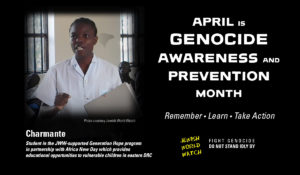The Democratic Republic of the Congo (DRC) has been plagued by violence, corruption, and poor governance for decades. Since the Second Congo War in 1998, conflict in eastern DRC has claimed over 5.4 million lives, and displaced more than three million people.
Various militia groups and government forces are both responsible for committing heinous crimes against humanity. Rape has been used as a weapon of war, instilling widespread fear and fracturing communities. Children are often kidnapped and conscripted as child soldiers, while young girls are forced to be sex slaves for militia fighters.
One of the key drivers of violence in eastern DRC is the fight over vast resource wealth in the region. Armed groups and corrupt officials generate millions of dollars from the mining and smuggling of conflict minerals: tin, tantalum, tungsten, and gold—found in our everyday electronics and jewelry.
In 2010, the U.S. Congress passed a piece of legislation known as the Dodd-Frank Wall Street Reform and Consumer Protection Act (Dodd-Frank). Section 1502 of Dodd-Frank addressed the issue of conflict minerals by requiring publicly traded companies in the U.S. to report if their products contain any of the designated conflict minerals, and if so, from where they are sourced. This due diligence reporting requires companies to determine whether the purchase of these minerals could be funding armed groups. While progress has been slow, one of the major successes of this effort was Intel’s release of the first-ever conflict-free product (a microprocessor) containing minerals sourced from Congo. Most recently, Apple Inc. announced that it will audit all of its suppliers to for the use of conflict minerals that may be linked to violent armed groups.
“When Elephants Fight” is a new documentary by Mike Ramsdell, who joined JWW on a trip to the DRC in 2011. The film explores the history of the DRC and illustrates current issues plaguing the region, including mineral exploitation. Watch the trailer below, and consider hosting a screening in your community. Visit Stand With Congo for more information.
Presidential elections are scheduled in the Democratic Republic of the Congo for late 2016. President Joseph Kabila, who has been in power since 2001 and is constitutionally required to step down this year, is trying to cling to power. Kabila has employed various tactics to hold onto power. Last year, he tried to tie the election to a national census, which analysts expected would take as long as three years to complete. Congolese activists, civil society, and student groups, have all stood against Kabila’s attempted power grab, taking to the streets to protest his actions. These protests have been met with violent crackdowns, deaths, and a number of arrests.
The U.S. government and the U.N. Security Council, among others, have been outspoken against Kabila and have urged the DRC government to abide by the constitution and hold free, fair, and transparent elections allowing for democratic transition.
Jewish World Watch continues to advocate for additional pressure to be put on Kabila to step down, and we continue to be supportive of companies being responsible in their mineral sourcing. Additionally, Jewish World Watch supports a number of on-the-ground projects in the eastern DRC that serve the most vulnerable populations affected by violence. Charmante, pictured in the header photo, is a participant in the Generation Hope program implemented by our partner Un Jour Nouveau/Africa New Day. The program supports the most vulnerable children of Goma, North Kivu, providing education, mentorship and spiritual leadership. For more information on additional projects and to support these local initiatives visit our website.
Today, you can take action by joining the #STANDWITHCONGO campaign in demanding transparency in the DRC. Click here to sign the petition calling on corporations to disclose who is profiting from deals made in the Congo and asking the governments of the DRC and the United States to take a stand against corruption.


